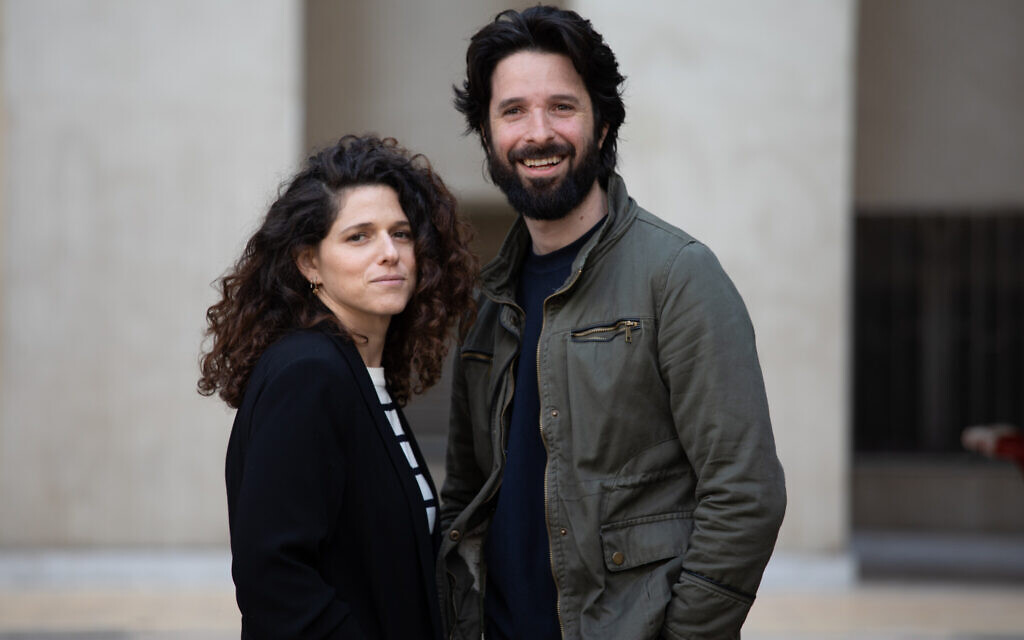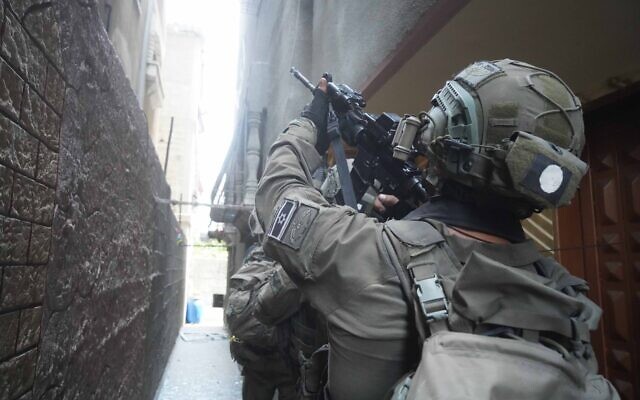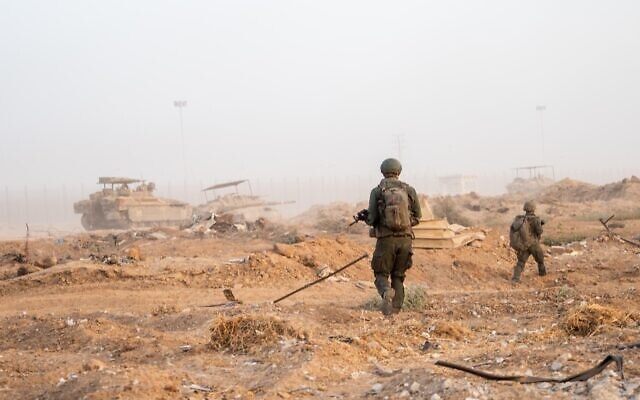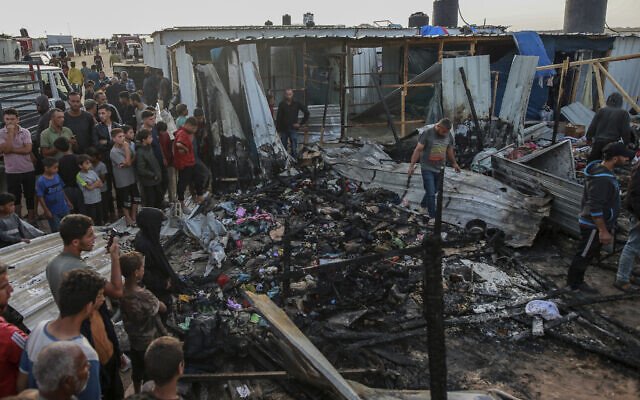With theater actors’ legs intact, TV’s ‘Rehearsals’ breaks a heart instead
Actors Erez Drigues and Noa Koler, a one-time real-life couple, bring their fictionalized break-up to Kan for a surprise runaway hit that’s an ode to the shuttered theater world

It’s been 10 months since anyone in Israel has been able to sit in a theater and laugh — or cry — at a tale acted out on stage.
You still can’t go out for a night at the opera, but a surprise hit TV show offers the next best thing: A backstage pass to all the drama that goes on when the curtains are down.
And unlike the real theater, “Rehearsals” can be binge-watched in just over five hours on the Kan website, where all 10 episodes are being streamed in Hebrew.
Called “Hazarot” in Hebrew, each 30-minute episode brings viewers backstage to the Mishkan Theater, a fictional mashup of Tel Aviv’s familiar Gesher, Habima and Cameri theaters, where the cast offers the hilariously poignant and all-too-real story of Tomer (Erez Drigues) and Iris (Noa Koler), a couple who are splitting up, just as they’re finally offered the opportunity to stage and direct her play about their relationship.
The show’s cast includes veteran Israeli actor Shmil Ben Ari and a standout performance by Evgenia Dodina as Vera, the strong, no-nonsense Russian-born theater manager who gets some of the show’s best lines. Agam Rudberg and Itay Turgeman play the actors in the play being rehearsed, each with their own dramas playing out behind the scenes.
It’s a series about acting and theater, with layers of irony, plenty of inside jokes, and behind-the-scenes escapism. Perhaps the biggest irony of all is that Drigues and Koler, both familiar faces from Israeli film and television, were once a couple themselves, back in their twenties when they were studying at the Yoram Levinstein acting school.
The play being rehearsed and staged in “Rehearsals” is “One Plus One,” which was an actual play written by Drigues and Koler and performed by them at the Gesher Theatre 10 years ago.

While Drigues and Koler began writing the script for “Rehearsals” back then, that’s where the similarities between reality and fiction end, said Drigues.
“Nothing that we describe really happened to us in the same way,” said Drigues, during an interview with The Times of Israel. “Even the premise of two exes writing a show together; it wasn’t like that for us.”
Still, said Drigues, he and Koler took certain ideas and concepts and layered those images together to create “Rehearsals.”
“It’s a kind of puzzle, because that’s how you create a story,” he said. “We wrote it from what we now know about relationships.”

Koler and Drigues have partnered with other people in the ensuing decade, but their romantic past is a delicious silver lining to this dramatic farce in which the two main characters, Tomer and Iris, have pet names for one another — “Tzutz” — and a million and one other habits and endearments that make their TV relationship so utterly believable.
It’s a bit of shock to see the story they wrote so long ago turned into a series that’s resonated so deeply with Israeli audiences, said Drigues, who sounds only slightly like his “Rehearsals” alter-ego, Tomer, with a tendency toward one-word responses.
“You really don’t think that many people will watch,” said Drigues.
Instead, the show had boffo popularity during its November-January launch and the pair, along with writing partner Assaf Amir, have already been commissioned by Kan to write a second season.
“It messes with your head,” said Drigues, 39, who’s also been fielding questions about his full mane of straight brown hair, which is nearly a character of its own right in “Rehearsals.” “It’s like taking your bar mitzvah video and turning it into a blockbuster movie.”
(Drigues’s coiffure, by the way, is similar to his father’s hair, he said, adding that he’s used to talking about his hair, although it’s been a more personal topic of conversation until now.)
It took Drigues and Koler 10 years to complete the script, working off and on for the first five or six years before getting down to business with co-writer Amir.
They embarked on the project before they started getting TV and film roles, said Drigues, but they always planned on playing themselves in “Rehearsals,” because that was the motivation from the very start.
“Then things change, and your career takes off, but this project was always there, writing these roles for ourselves,” he said.

The relationships that both actors have forged personally and professionally are the underlying force behind “Rehearsals,” which delves deeply into relationships of every kind; the bonds between lovers, couples, friends, siblings, families, colleagues, neighbors, and, of course, the complex dance navigated by Tomer and Noa as they transition from couple to colleagues.
It’s a very Israeli show, said Drigues, as it unpacks the play being rehearsed, as well as the culture of the Israeli theater industry.
“Rehearsals” describes the very small world of Israeli actors, where professionals may be better known for their roles in a popular TV show while performing classics — or idiosyncratic comedies — on the Israeli stage for weeks at a time.
And while the show celebrates the current golden age of TV, with the very real possibility of being picked up to be distributed on a global platform like Netflix, Apple TV or Amazon Prime, it’s also a celebration of theater, and Israeli theater in particular, said Drigues.
“We come with a lot of love for theater, because we’re part of the theater family,” said Drigues. “We have a lot to say because we know it from up close. Not just the gossip, but the magic of it, because there is so much that’s special about it.”
Are you relying on The Times of Israel for accurate and timely coverage right now? If so, please join The Times of Israel Community. For as little as $6/month, you will:
- Support our independent journalists who are working around the clock;
- Read ToI with a clear, ads-free experience on our site, apps and emails; and
- Gain access to exclusive content shared only with the ToI Community, including exclusive webinars with our reporters and weekly letters from founding editor David Horovitz.

We’re really pleased that you’ve read X Times of Israel articles in the past month.
That’s why we started the Times of Israel eleven years ago - to provide discerning readers like you with must-read coverage of Israel and the Jewish world.
So now we have a request. Unlike other news outlets, we haven’t put up a paywall. But as the journalism we do is costly, we invite readers for whom The Times of Israel has become important to help support our work by joining The Times of Israel Community.
For as little as $6 a month you can help support our quality journalism while enjoying The Times of Israel AD-FREE, as well as accessing exclusive content available only to Times of Israel Community members.
Thank you,
David Horovitz, Founding Editor of The Times of Israel










